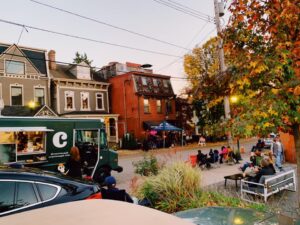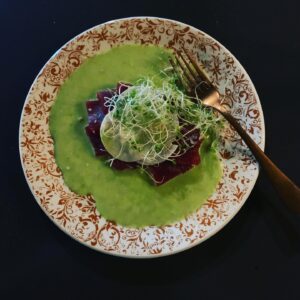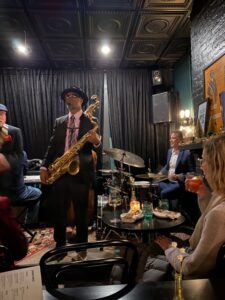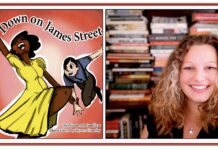Written By Lissa Brennan
Outside on a December night on Shadyside’s Ellsworth Avenue, winter has arrived. It doesn’t twinkle with snowflakes that gently settle into gleaming drifts; it assaults with biting wind and sleet that feels like an attack. But inside Con Alma, the intimate club and restaurant that proclaims its commitment to holding cuisine, cocktails, and music in parallel esteem with the slogan “Eat/Drink/Jazz”, it’s absolutely scorching.
The David Throckmorton trio- the eponymous leader on drums, with Scott Boni on sax and Jeff Grubbs on bass- is finishing up their second and final set of the night. Tonight’s performance concludes as a quartet, with guitarist and Con Alma Musical Curator John Shannon joining them. And while it’s cold and bleak out on the street, in here they’re on fire.
Each musician takes the reins in turn as they blow through a blistering rendition of Pat Metheny’s “So It May Secretly Begin,” in a dialogue without words that shift from one melodious voice to another. It’s a rich and resonant exchange; every man gives it all he’s got and their appreciation of each other and what they’re making together is not only evident but irresistible. The song comes to an end; musicians beam at each other; their instruments seem to glow with residual magic.
At this point we should hear applause that’s thunderous and raucous, scored by whoops and whistles and at least one guy screaming “Yeah! Yeah!”, bringing down the house in gratitude for the music as much as the music did itself.
Instead, there’s silence. A bartender, server, owner furiously gesture, swooping their arms up above their heads in moves big, bold, noiseless, their hands stopping just short of coming together. Because while these musicians have played their hearts out as if before the greatest audience of their lives, the only spectators are staff. There’s a pandemic. No one else is permitted inside the building. But through a camera newly mounted just below the ceiling, the music can be heard from home, or anywhere you can get online. The livestreamed concerts are a lush oasis within the desert that Coronavirus has made of the performing arts.
* * *
 Con Alma has been a haven for live music throughout almost the entirety of the various shutdowns. Opened in June of 2019, the venue and restaurant took a balanced approach to uniting world class jazz with equally distinctive craft cocktails and superb Latin American and Caribbean influenced fare. When regulations began, they stretched beyond the initial offering of take-out with first outdoor music, and then outdoor dining as well.
Con Alma has been a haven for live music throughout almost the entirety of the various shutdowns. Opened in June of 2019, the venue and restaurant took a balanced approach to uniting world class jazz with equally distinctive craft cocktails and superb Latin American and Caribbean influenced fare. When regulations began, they stretched beyond the initial offering of take-out with first outdoor music, and then outdoor dining as well.
“It was one of the few ways for people to still have live music and the arts in their lives because it was distanced,” says Aimee Marshall of the original transition. Marshall is the general manager and a partner along with Shannon and executive chef Joshua Ross.
It worked. The tables where guests could receive full dining service sold out quickly and often, supplemented by crowds who brought their own chairs and grabbed food and drinks to go, setting up camp on the facing sidewalk.
“All of a sudden people started hanging out across the street and it turned into a whole outdoor concert series,” says Shannon. “It was kind of like a perfect storm, all of these elements that we had never foreseen worked in our favor.”
During the summer and early fall, this was a roaring success. The atmosphere segued from one of making do around restrictions into a convivial scene that was in and of itself an enticement. But even when weekends meant sold-out crowds as late as September and October, says Shannon, “we knew on the horizon cold weather was coming in.”
While there were supporters ardent enough to huddle around heaters, musical instruments can be more temperamental in response to temperature, as can things like fingers and breath. It was imperative to bring the music in, but impossible to bring the audience with it.
Doing livestreams had been on the wish list from the beginning, to open access to as many people as attainable while developing an archive of the Pittsburgh jazz scene. Now they became necessary. Shannon’s job responsibilities expanded, as did his skillset. “It’s not simple tech, not to me anyway,” he says. “It’s not just about downloading an app and hitting the buttons, you have to connect to this program and that one, find that they’re not compatible with this computer, have this person do the camera, this person does the software, this person does the server. Then try to understand all of their language.”
It was an investment for the restaurant as well. “It was certainly a process, but necessary for the level of musicians here,” Marshall says. “They’re world-renowned. It wasn’t something we could do halfway.” What results makes it more than worth it; Marshall was a test audience listening at home for the trial performance and found it “incredible”; feedback from others supports her reaction. And as much as this is a new way of experiencing Con Alma, as Shannon says, “It’s still Con Alma. The musicians are still playing at Con Alma, and people who know Con Alma can connect to that just by thinking of it. It’s a heart-based creation.”
“Heart-based” might seem an odd way to describe what after all is said and done is a business, but it’s also an accurate one. As things changed for restaurants yet again, the simplest way to proceed would have been to focus on take-out food and drinks and eliminate music from the equation, shelving performances until there was an easier way to incorporate them into the mix.
This wasn’t an option.
“We’re unfortunately one of the few clubs left in Pittsburgh to play at,” says Marshall. “We not only have a responsibility for all of our staff members here in our little place, our little dream that we opened. We also have a responsibility to these musicians.”
* * *
“The way that we performed, in front of no audience, was not much different from the feeling of making a recording in a studio,” says one of those musicians, Scott Boni, who’s been on the roster at Con Alma enough times to consider it a familiar place, of this brave new world. “For me, the challenge came from being in a place that is normally filled with an engaged audience suddenly being empty.”
Watching from inside, the performance is dedicated, passionate, complete while the music sings through the space. It’s easy to forget when lost within the song that while it’s born in an environment that’s known, the larger environment within which we presently dwell is an alien one. But when the last note fades away, it’s eerily quiet. It’s jarring and strange to observe, and one imagines even more so for the musicians, especially after the fervent enthusiasm of the community built during the sidewalk sets.
For Jeff Grubbs, the sound of no hands clapping is loud. “Normally, the performers are energized by the presence of a live audience and get feedback from their applause. You can sort of get that with many self-produced livestreamed performances when you can check the feed to see how many people are watching, and feedback is given in the form of written comments.” That isn’t an element of these live streams, so, he says, “it can feel a little bit empty at the end of the performance.”
Live music is more than just the action of one group of people making sounds and another group of people hearing them. It’s interactive, it’s about connection and communication and something that’s engendered by all of these people being together and each individual bringing their part to the encounter, to forge a whole far greater than the sum of its parts. This is no exception. And of all forms of music to be presented in this format, jazz, Shannon believes, is the one that can translate the best.
“There’s a conversation that’s actively going on between the musicians,” he says. “The beauty of jazz music is listeners become part of the conversation. It’s exciting music to be livestreamed because you still get to witness the energy between musicians, it’s dynamic and evolving.”
While the setting might be different, the diamond still sparkles. What these musicians are learning, what we’re learning, all of us, throughout this, is how flexible we are, that we can adapt to what we didn’t think we could adapt to, and quickly. And as we wait, and hope, and fear, and dream, and work, and worry, in a world in which we never saw ourselves living, we can also find ourselves the necessary time that we need to rest, and be moved, and accept beauty.
“I like to think that as performers we help transport an audience away from their typical day just for a little while,” says Boni. “In this case, it’s nice to think that with so many people staying in as Covid surges, perhaps we help people feel some comfort and enjoyment.”
* * *
This is all wonderful from the perspective of a patron. It’s easy to look at the food, the drinks, the music, the generosity, and say, what a great thing they’re doing for everyone!, and that’s true. It is. But it’s also something essential, integral for the survival of the restaurant that like all restaurants is dependent on keeping income streams flowing, as help is unpredictable in its availability and frequently meager when it arrives.
Con Alma was fortunate enough to recently receive a grant that will carry them through the end of the year. But this assistance provides enough to keep the business alive. It doesn’t come close to matching the bounty which the service industry ordinarily receives throughout the holidays, so businesses and individuals can squirrel away reserves to plunder during the slowest season, the rest of the winter. The wolf might not yet be in the building, but he’s howling at the door. Restaurants in Allegheny County are closed through January 4th. That’s the earliest that they’ll reopen, but it might take longer.
Con Alma is a snug, cozy venue. That closeness contributes to the feeling of inclusion and connection one feels when in the space. While this was undeniably a merit in previous times, it doesn’t translate to where we are today, even when operating at a reduced capacity is possible.
“Once you take into account our staff and musicians [who are included in occupancy counts] we could only allow for a couple of tables,” says Marshall, “and it’s just not a good idea for us as a small space. Places that are larger are able to distance, but for us it just wasn’t a possibility.” This means that even when restrictions are altered to sanction restaurants to partially operate with indoor dining, Con Alma is likely to carry on traveling the existing path.
That means diners, drinkers, listeners can pick up (or have delivered within a reasonable radius) food, festive beverages, and a code to livestream that evening’s musical program. Orders are placed in advance online or by phone; upon arrival a quick call to the restaurant brings your food to a table out front for a fully contact-free interaction.
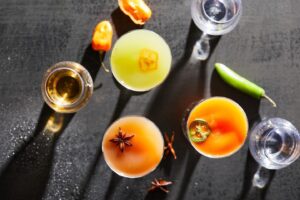 “We still constantly change our menu, we are still adding to our cocktail list, I’m still bringing in wines that are different and new for people,” Marshall says of the non-musical elements. “It’s not the same every week, and I think that’s a plus as well.” Christmas Eve features a special package with Latin American holiday favorites from the kitchen (with a vegetarian option available) and holiday music on stage. “I think it’s going to be really special, especially for those of us that are going to be very close to alone on the holidays.” It also gives an opportunity to pay it forward, as the Con Alma team continue their own tradition of helping others how they can. For every dinner purchased, the restaurant will donate a dinner to UPMC nurses and doctors.
“We still constantly change our menu, we are still adding to our cocktail list, I’m still bringing in wines that are different and new for people,” Marshall says of the non-musical elements. “It’s not the same every week, and I think that’s a plus as well.” Christmas Eve features a special package with Latin American holiday favorites from the kitchen (with a vegetarian option available) and holiday music on stage. “I think it’s going to be really special, especially for those of us that are going to be very close to alone on the holidays.” It also gives an opportunity to pay it forward, as the Con Alma team continue their own tradition of helping others how they can. For every dinner purchased, the restaurant will donate a dinner to UPMC nurses and doctors.
“Con Alma”, from the title of a Dizzy Gillespie standard, translates to “with soul”, and encapsulates how all involved approach the business of making art and sharing hospitality. There would be no reason to worry about keeping this heart beating if caliber and goodness were the only factors determining the longevity of a business. But they’re not. Restaurants need guests, whether they walk through the door or pick up bags outside; artists need patrons, whether they place cash in a tip jar or send support electronically. And communities need those who elevate the act of dining, in whatever form that takes.
One hopes that Con Alma can not only survive this but thrive beyond it. Because the loss of this much soul wouldn’t simply dim the neon on the wall spelling out their name in glowing, vibrant pink. It would make things darker for us all.




